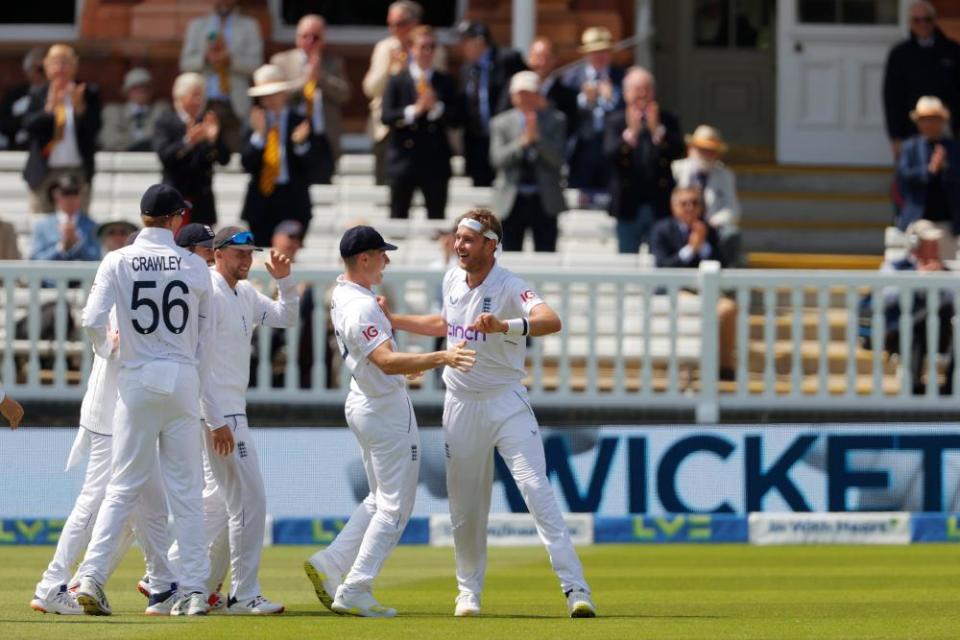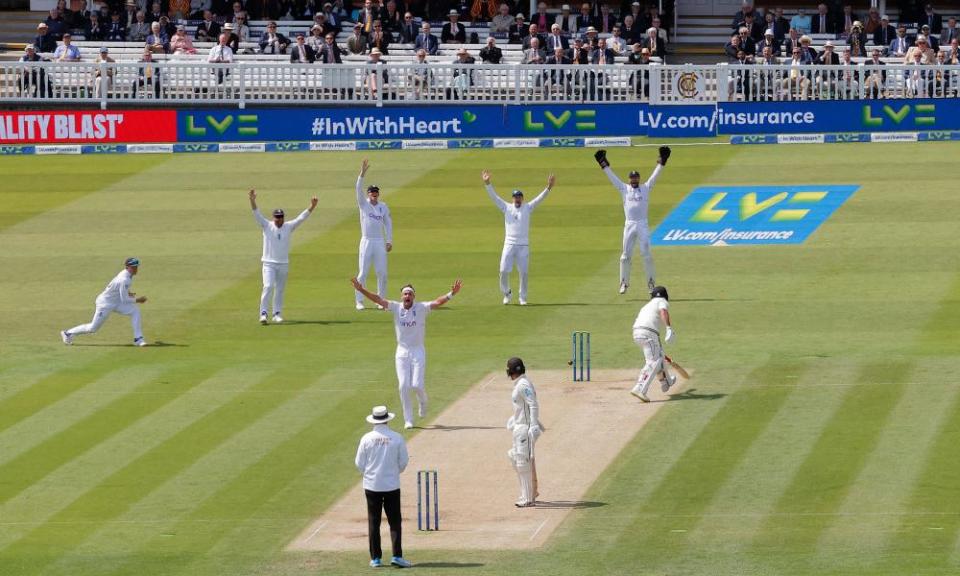Old warrior Broad lights up Lord’s to prove he still has appetite for the fight

Stuart Broad did not want to be batting on Friday morning. But the previous evening England had collapsed, again, five wickets for eight runs this time, and dumped him right back into the thick of it. So here he was. England were 116 for seven, still 16 runs behind, and Trent Boult was bowling. Broad walloped his first ball for four, then turned the next away for a single.
Ben Foakes played out the rest of the over so Broad was facing Tim Southee now. He hit another four, down the ground, then he took a swing at the next delivery and missed it altogether. Up on the balcony, Ben Stokes winced.
Related: Primal power of Kyle Jamieson is one of Test cricket’s great wonders | Jonathan Liew
Broad threw his bat at the one after that, too, and it knocked his stumps clean out of the ground. Broad turned, tucked his bat under his arm, and walked briskly back to the pavilion. If he looked up, he would have seen Stokes burying his head in his hands.
It was a desultory innings, a motley array of half‑cocked shots from a batsman who once made 169 on this ground but is now long past bothering with playing properly. What was it Broad said when they were debating how the bowlers were getting on in the Ashes last winter? “It doesn’t matter what bowlers you play if you get bowled out for 140. It might be a bit brutal, but that’s the truth in Test cricket.” This time they had made all of 141.
Broad bowled well early on the first morning, especially in his first spell – four overs, one for eight – but he seemed to flag in the second innings. It felt as if it wasn’t New Zealand’s batting that sapped him so much as the wearisome familiarity of England’s own.
He must have been stiff from the short turnaround between the innings, cheesed off at ending up in this sort of mess all over again. Broad turns 36 in a couple of weeks. He knows he has a job waiting for him on Sky’s commentary team. Of course there are questions about how long he wants to go on. He was asking them himself after England dropped him for the tour of the West Indies in the spring.
On commentary on Friday afternoon, Kevin Pietersen wondered aloud if Broad was still as keen as he had been on the first morning. His pace had dropped to about 78mph and Pietersen suggested that the New Zealanders ought to try walking down the wicket to mess with his length.

Broad was out early on Saturday morning. There was rain in the air and the start of play had been delayed by 30 minutes, but he was practising on a pitch on the far edge of the strip. His teammates were all still in the changing room.
Old players will tell you that the decision to retire comes on suddenly; often, they say, it happens when you wake up one morning and realise you just don’t want it any more, not the way you used to do anyway. Who knows what Broad was thinking about while he was out there bowling on his own? KP, maybe, and the view from up there in the media centre.
Related: Stuart Broad rejoices in ‘dreamworld’ of England’s transformative morning
At 11.30am, Broad opened the bowling for the day. It was his 23rd over of the innings. In it, Daryl Mitchell brought up his century by driving three runs through extra cover. New Zealand’s lead was 233 and the match was slipping away from England. But Broad had a new ball to work with, and one last tantalising chance to try to get his team back into the match.
Once more, then, with feeling.
Broad landed one right where he wanted it. It whipped in on a length, moved just enough to take the edge of Mitchell’s bat and fly to slip.
Broad wanted more. At the top of his run, he started waving his hands around, gesturing to the crowd, shaking them awake, whipping them up from their morning torpor. It took them a little time to catch on to what he wanted, but when they did they started cheering him in.
The next ball was fuller and straighter and it hit Colin de Grandhomme on the pads, Broad spun on his heel and shouted his appeal, the umpire shook his head, it was missing leg.

But De Grandhomme had lurched out of his ground, and while everyone else was busy appealing Ollie Pope gathered the ball and broke the stumps with a throw to run him out. Broad whipped his hands again, and all of a sudden the crowd of 30,000 were roaring for him, as if Lord’s was running off his electricity.
The next ball beat Kyle Jamieson, and bowled him. That made it three wickets in three deliveries. It was a team hat-trick but it was Broad’s moment. He had done it, he had pulled the team back into the match, with his skill, will, and speed, and the realisation that he wasn’t ready to give it all up just yet.

 Yahoo Sport
Yahoo Sport 





































